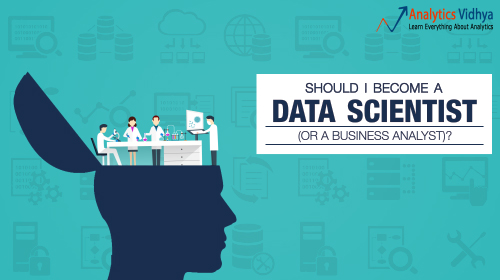Introduction
One of the common queries I come across repeatedly on several forums is “Should I become a data scientist (or an analyst)?” The query takes various forms and factors, but here is a common real-life anecdote:
“I have been doing Sales for multiple BFSI giants for last 3 years, but I have stopped enjoying my role. After reading about Business Analytics and machine learning, my interest in this area has grown. Should I make a switch and learn data science? If so, How do I do this?
When I reflect back on how I took the decision, I realized – I happened to be lucky! The decision was relatively easier for me. Why? I knew the industries/roles, I would not enjoy – these included roles in Sales, roles in Physical engineering, and a few others. I was open to roles in data science in retail banks and investment banks and luckily ended up with Capital One.
Today, after spending ~8 years in the industry, it is far easier for me to guide and mentor people on whether Analytics is the right role for them or not. So, I thought, I’ll try and put my thoughts in a framework and share it with the audience of this blog. The aim of this post is to help those people who are sitting on the fence and thinking about which job/role is right for them. So, if you are someone deliberating a move in data science or are wondering whether you are a right fit with this industry, here is a neat framework that might help.
The role of a mentor in building a career is priceless. Being from the industry, the mentor can help you navigate your learning path so that you don’t fall into traps. Certified AI & ML BlackBelt Plus Program comes with 100+ hours of live-course, 100+hours of self-paced video, 18+ real-life projects, and the most important – 1:1 mentorship so that you can focus on becoming an industry-ready professional with the relevant guidance. 🙂
Framework
I have put a framework in the form of a very simple test. This test is based on the attributes every analyst should possess. You should score yourself against each of the questions (out of the score mentioned after the question) and then add your scores. A good analyst should score more than 70 and anyone scoring below 50 should seriously re-consider a decision to be a data scientist.
Test Questions:
- Do you love number crunching and logical problem solving – i.e. puzzles, probabilities, and statistics? (score out of 20)
By love I don’t mean like, I don’t mean you don’t mind numbers – I mean, do you have an obsession with numbers! Do you love doing guess-estimates at any time of the day – I have done those estimates while I am taking a shower, while I am driving, while I am watching a movie, or even when I am swimming (and lost my count of laps)! I know my friend Tavish does these calculations in his mind too – while he is driving or while he is playing badminton. If you want me to space out of a discussion, just ask me a really hard logical problem!
Key:
5 – dread mathematics & statistics, but can face to some extent
10 – Comfortable with mathematics and statistics, but need calculators and excel to work on problems. Don’t mind attempting puzzles
15 – Love crunching numbers and solving logical puzzles anywhere
20 – Can’t live without number crunching and logical puzzles – an obsession!
- Do you enjoy working/handling unstructured problems? (score out of 20)
An analyst will inevitably be tested against unstructured and amorphous business problems. And it is how you solve these unstructured problems, that decides how good or bad an analyst you are. My first project in my first role stated: “In last few months, we have seen a high increase in high-risk customers of type X. You need to come up with a data-based strategy to measure, control, and improve this situation.“
Even the business did not have a clear definition of these customers. Can you handle this kind of ambiguity and provide a direction on your own? Do you enjoy these situations or you would rather be comfortable in a more defined role?
Key:
5 – Have tried these problems in past – but not my cup of tea!
10 – A score of 10 would mean, you like solving these problems once in a while (say 3 – 6 months)
15+ – You prefer unstructured problems over-structured. You don’t enjoy someone else structuring problems for you.
- Do you enjoy deep research and can spend hours slicing and dicing data? (score out of 20)
Going back to the first project I faced, it took me 3 months to understand the business, have multiple discussions with stakeholders, brings them on the same page, and then mine the data to bring out solutions. You need an outlook of a researcher to be a good business analyst. When was the last time you spent hours and hours immersed in solving a problem? Can you do that again and again?
Key:
5 – You want a change every few hours. You can’t work on a single problem for the entire day
10 – You can work on a research problem – but need some side work to help you out of boredom
15 – You feel the side work is distracting you from making progress on the key problem you are working on. Would be happy if they are taken away
20 – Can’t stand distractions
- Do you enjoy building and presenting evidence-based stories? (score out of 20)
A data scientist needs to be a fluid presenter. What is the use of all the hard work, if he is not able to influence his stakeholders? Communicating with data and presenting stories backed by data is one of the most important elements in the life of a data scientist. Imagine being part of companies like Google and Amazon – you have all the data you need (probably more than that) for the domain you are working on, but you need to convert it into a meaningful story, present it to the stakeholders and influence them to take the right decision!
Key:
5 – You struggle to communicate my mathematical thoughts to the audience
10 – You can manage telling stories with a lot of practice. Can’t think of doing this on the fly!
15+ – Any time, anywhere!
- Do you always find yourself questioning people’s assumptions and are always curious to know ‘Why”? (score out of 10)
This is probably the best part and the most fun part! Here is a quote a read somewhere on Linkedin: Arguing with an Engineer is a lot like wrestling in the mud with a pig: After a few hours, you realize the pig likes it. Similarly, asking why comes naturally to a good data scientist. Some of the best data scientists would stop anyone and ask for a rationale if they are not clear – Why did you ask this question? What was your thought process? Why do you assume so? are just a few examples of these questions!
Key:
5 – You only ask questions when they are critical to be asked
8+ – You can’t stand the anxiety of not understanding something! Jumping to ask questions!
- Do you enjoy problem-solving and thrive on intellectual challenges? (score out of 10)
Analysts require a knack for problem-solving. Most of the problems businesses would face would be unique to them and it would take a smart solver to solve them. Solutions, which work for one organization may not work for another – you need to be someone who quickly develops a deep understanding of a problem and then come out with innovative ways to solve these problems
Key:
3 – You don’t mind thinking about solving problems – but you struggle.
6 – You can solve problems at times
9 / 10 – You just love the process of intellectual thinking
End Notes:
What is my score? I would score somewhere between 80 – 85 on this test. It is your turn now. Do take the test and let me know, how much do you score? Also, do let me know if you think the test was helpful or otherwise.
Please note that like all subjective questions, there are no right or wrong answers here. You might score low on the test, but still, be the best analyst/data scientist out there. However, the test should help most people facing confusion. If you still remain confused after reading this article, please feel free to share your confusion/query through the comments below. It will help you clear the confusion and it will help me improve this framework.
Did you like this framework? We at Analytics Vidhya follow an analytical approach to problem-solving. If you want to become a data scientist with this analytical mindset, check out the Certified AI & ML BlackBelt Plus Program which offers 100+ hours of live-course, 100+hours of self-paced video, 18+ real-life projects, and the most important – 1:1 mentorship. The course is carefully crafted by experts so that you can become an industry-ready professional!
Now that you know that you can / can not become a data scientist, you might be asking “How do I become a data scientist?”. Here’s the Roadmap –







